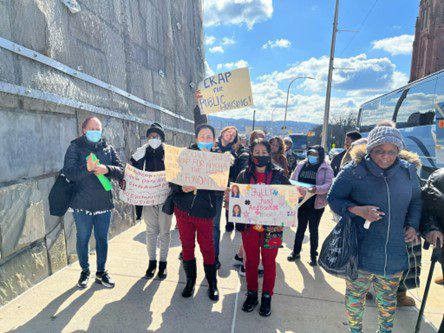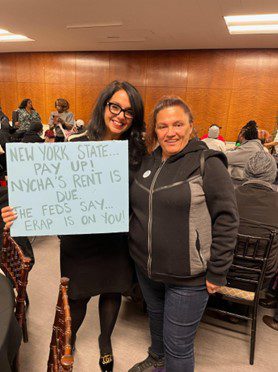Improving Indoor Air Quality—Community Spotlight
Red Hook Initiative

Red Hook residents arriving in Albany to demand Emergency Rental Assistance Program (ERAP) funding for the New York City Housing Authority (NYCHA).
Red Hook Initiative (RHI) is a community-based organization in Red Hook, Brooklyn, founded in 2002. At Red Hook Initiative, we believe that social change to overcome systemic inequities begins with empowered youth. In partnership with community adults, we nurture young people in Red Hook to be inspired, resilient and healthy, and to envision themselves as co-creators of their lives, community, and society.
Youth development, community building, and community hiring are at the core of our approach to strengthening Red Hook’s future. RHI’s model gives young people and residents the tools, resources, and opportunities they need to interrupt the systems and barriers that perpetuate historic inequities for the Red Hook community. Residents lead the way toward a more equitable, hopeful future. RHI primarily serves residents of Red Hook Houses, the second largest development of New York City Housing Authority (NYCHA) in New York City and home to nearly 10,000 people. NYCHA, as are other public housing authorities, is severely in debt, resulting in declining infrastructure that negatively impacts health and contributes to conditions of mold, leaks, lead, and chronic repairs. Community residents have identified home repairs as the number-one needed service to improve health in Red Hook.
RHI’s Community Building team is working to improve the health and economic well-being of Red Hook residents while also working to change root cause issues of problems impacting the community. We are working toward a future of a thriving community where Red Hook residents are better connected to their neighbors, have access to affordable and safe housing, quality and community-responsive healthcare, clean air, and economic stability. This happens through direct service and case management, activation of public space and community events, leadership development and community organizing, citizen science, and coalition work. RHI’s Community Building team is made up of a diverse multigenerational and multilingual group of members of the Red Hook community, social workers, community advocates, representing a range of identities that is reflective of and responsive to the Red Hook neighborhood.
What are some unique and innovative programs or services offered by your organization? Or: Tell us about a current project that excites you. Or: What has been a win or top accomplishment?
Something that’s unique about our program is that we address both the immediate social service needs while also building power to organize. For example, in 2022, public housing residents were left out of a critical resource from the federal government, the Emergency Rental Assistance Program (ERAP), which provided rent payments for those impacted by COVID-19. The benefit would have alleviated critical rent arrears facing the housing agency. Throughout the pandemic, our case managers worked diligently to sign up as many clients as possible for the benefit. When the State of New York rolled out the program, it was structured to exclude public housing residents by leaving Section 8 and federally subsidized housing to the end of the line and therefore left out of any benefits when the funding ran out. After learning this, we responded with organizing and action. We contacted clients who had applied and organized public testimony to demonstrate the impact. When testimony wasn’t successful in pushing the state to allocate funds, we joined NYCHA residents and allies from throughout NYC in Albany to demand a portion of the budget be allocated to NYCHA.
Along with allies throughout the state, we won!—$350 million was invested in New York State’s ERAP for public and subsidized housing residents, including NYCHA, and $35 million specifically to pay New York City Housing Authority (NYCHA) tenant arrears in addition to the ERAP funding. Following the announcement, we notified residents who applied through our team and continued to assist in ensuring payments were made.
What do you think is the most pressing challenge facing your organization and/or the community you serve?
Red Hook has suffered decades of environmental racism and injustice, from geographic isolation resulting from the construction of the Brooklyn Queens Expressway to the long-term environmental impact of the Columbia Smelting and Refining Works site to disinvestment in the Red Hook Houses. Residents living in Red Hook Houses (Census Tract 85) are disproportionately affected by environmental hazards as evident in recent health data; the area falls within the 94th percentile in the country for asthma diagnosis.1 Within New York State’s recent “Disadvantaged Communities” map, Census Tract 85 is identified with several alarming indicators: 74th percentile for asthma emergency room visits, 99th percentile for potential exposure to PM2.5, 60th percentile for premature deaths, and 62nd percentile for COPD emergency room visits.2 Within the EPA’s EJScreen tool, Red Hook Houses Census Tract 85 has additional environmental justice indicators: rating in the 99th percentile in nearly every category and above the 90th percentile in every socioeconomic indicator.
One challenge we face currently in healthy housing for Red Hook families is the impact of several mega-construction projects happening in the community since 2020, including a Superfund remediation, a large-scale resiliency project in NYCHA, development of last-mile warehouses, and the expansion of cruise ships docking on Red Hook’s port. The NYCHA construction project, which is the result of a $500-million investment in resiliency infrastructure as a result of damage from Hurricane Sandy in 2012, has disrupted quality of life, deeply impacted respiratory health, and caused stress and anxiety among community members. All at once in the spring of 2020, the development was transformed into a construction zone: Scaffolds were erected on every building, all benches and playgrounds were removed, and 457 mature trees were cut down. Under the umbrella of a project that aimed to strengthen resilience, the temperatures skyrocketed, toxic soil was left in large piles for months, and community members were left with the complete absence of outdoor space at the height of the pandemic.
Since that point, RHI has collaborated with neighborhood partners and community members to increase transparency of the project and ensure health and safety is prioritized. Despite progress, the community continues to face deep challenges with the construction.
A second challenge is securing sustained, catalytic funding for the type of system-changing, community-led work we do. The inequities we are working to dismantle have taken years to structurally and systemically develop; and then have compounded as crises and oppression are manufactured and pressed onto our local leaders. Changing those systems, mobilizing people, and shifting mindsets is a long-term project of learning, relationship making, and creativity. That is how we build power, but philanthropy’s short-term strategic planning and lack of trust-based funding undermines the long game. Funding that recognizes and sustains movement building work from introductory organizing through community-led power building is multigenerational, scaled change—this would be a game changer.
What do you value most about your partnership with NCHH and others in the healthy housing space?
Our partnership with NCHH and others in the healthy housing space has enabled our organization to make critical connections with other entities leading similar work. Through these connections, we’ve been able to tap into knowledge and best practices that we otherwise would not have been able to access on our own. NCHH’s support in thinking through legislative priorities, particularly at the national level, has been extremely valuable in our work; for example, connecting us with policymakers outside of New York City who are working on the same issues. We are grateful to the researchers, policy experts, medical partners, and community advocates on the ground who continue to help guide us forward.
To learn more about Red Hook Initiative’s work, visit RHI’s website or contact them at info@rhicenter.org.
Latest page update: October 4, 2024.

